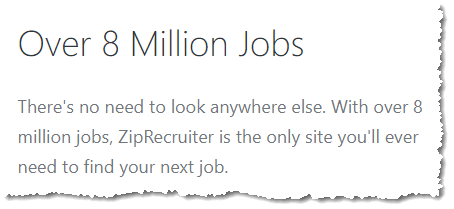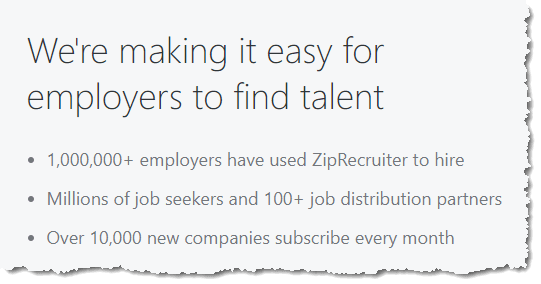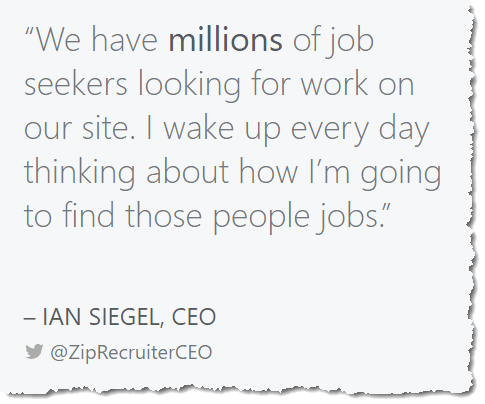In the August 21, 2018 Ask The Headhunter Newsletter we take a hard look at the death of HR at the hands of database firms that make money when you don’t find a job — and when employers don’t fill jobs. Can HR be saved?

La mort de HR
A company’s best hope for finding and hiring great workers is its own managers, because they know the work best
HR (Human Resources) may be a close second — when HR actually goes out to look for and recruit workers.
But ZipRecruiter, Indeed, LinkedIn and a league of database companies have succeeded in killing HR’s recruiting role — and the initiative of hiring managers.
Stripped of the function that once gave HR bragging rights for a company’s most competitive advantage — hiring great workers — HR now serves as little more than the fire hose that overwhelms companies with millions of inappropriate incoming job applications, and as the spigot that pours billions of corporate dollars into the pockets of database jockeys who know nothing about matching real people to real jobs.
Killing HR in 30 seconds
This is what the wildly successful marketing campaign to kill HR looks like:
This commercial — and others like it — have literally killed recruiting because they have replaced it in employers’ minds with a substitute that has no nutritional value.
Here’s how an HR vice president with a Fortune 50 company put it to me when the online “recruiting” industry first launched its brainwashing campaign:
“Executives from the online job boards wine and dine our top executives so relentlessly that virtually every dime of our recruiting budget now goes directly to them. I can’t get a few bucks any more to take a candidate to dinner to actually recruit them!”
A massive marketing campaign driven by database jockeys has replaced people — workers, job seekers, the actual talent — with automated streams of keywords and database records. Employers have de-funded real recruiting to the point where the task no longer has anything to do with actively pursuing, seducing, cajoling, convincing the best people to join your company.
A powerful, long-running marketing campaign has successfully sold the idea that “recruiting” no longer requires talent to do it, like other jobs require talent. “Recruiting” is now the automated churning and turning of databases. (See Job boards say they fill most jobs. Employer says “LMAO!”)
How can a 30-second commercial kill an entire profession?
The insecurity of HR
The success of this campaign to automate recruiting and bury HR is due not only to its persistence, but to the acquiescence of the HR profession itself.
With few notable exceptions, HR executives and professional associations across the board have slit HR’s throat and outsourced HR’s key job to database jockeys who have wowed them with “high tech solutions.” The HR profession as a whole was never very secure in the C-suite, and never very bright, so it folded quickly when fast-talking salespeople embarrassed its leaders with big terms like “algorithm” and “database” and “intelligent agents” and “semantic processing” — terms so misapplied and misconstrued in the HR context that they are laughable.
Loathe to admit their ignorance, HR leaders feigned excitement while their “HR consultant” brethren fed them white papers about the newest “best practices” that should be “implemented in software” immediately. (See HR Technology: Terrorizing the candidates.)
So, HR arrived fully brainwashed into a new era and promptly ran the talent ship aground in the shoals of the job boards, taking big parts of the economy down with it.
The brainwashing of HR
TV commercials like the one above from ZipRecruiter pound four dangerous ideas into the heads of corporate leaders, HR executives and hiring managers.
- Recruiting and hiring are nasty work nobody wants to do.
- Recruiting and hiring are very difficult tasks.
- Nobody is good at recruiting and hiring.
- ZipRecruiter (and Indeed and LinkedIn and other database companies) will do it for you if you pay them.
The trouble is, none of that is true. Those are some of the most dangerous lies ever created by marketing copy writers.
Count the lies
Recruiting and hiring are mission-critical tasks best done by you and your company — face-to-face, not by diddling a keyboard to pay a middle man who pretends to do it for you. Recruiting and hiring are so critical to your company’s mission that leaving them to firms that have no skin in the game is not only irresponsible — it’s an insane fool’s errand.
So, is it insanity or foolishness that leads employers and their HR departments to buy what the database jockeys sell under the guise of “recruiting?”
Please watch the commercial above. It’s short — 30 seconds. Here’s what the guy says:
“Hiring was always always a huge challenge. Endless hours on job sites with not a lot to show for it. Then, I found ZipRecruiter. They figured out hiring. I post my job. They put it all over the web. And they send me the right people. Because their technology is smart. ZipRecruiter often sends me the right person in 24 hours.”
Count the lies.
1. “Hiring was always always a huge challenge.”
The truth: Hiring is your job; your number-one job. When ZipRecruiter characterizes hiring as something “huge” — something beyond you and your company — Zip disparages you and insults you. It also convinces you that the most important part of your job is a problem you should unload.
2. “Endless hours on job sites with not a lot to show for it.”
The truth: If you’re spending endless hours on job sites, diddling databases, and sorting keywords, then I guarantee you have nothing to show for it — because that’s not where hires come from.
But that’s what ZipRecruiter sells — databases and keywords!
Zip, Indeed, Glassdoor, LinkedIn and countless others of their ilk sell an excuse for not recruiting and hiring.
If you want something to show for your recruiting efforts, invest your time participating actively in your professional community, cultivating and meeting the movers and shakers and opinion makers who know all the best workers. Share valuable experiences with your peers and they will lead you to great people you can hire. No one ever wasted their time talking with peers.
3. “Then, I found ZipRecruiter. They figured out hiring.”
The truth: This is the biggest lie. ZipRecruiter and its ilk have not figured out hiring. They figured out their own business plan: how to make money.
The marketing trick is to convince you they are on your side, helping you do your job. But spend 10 seconds thinking about the business model behind these operations and you will see the blinding flash of the obvious:
- These companies make money when you do not fill jobs.
- They make money when you keep searching their databases looking for hires.
If ZipRecruiter had figured out hiring, its home page and its marketing would blare out audited metrics about employers’ success rates when they pay Zip for lists of job seekers. But that’s not what Zip has figured out, and it’s not what Zip is selling you or what you’re paying for.
Here’s what ZipRecruiter blares out on its website — this is what your company is paying for:

ZipRecruiter makes money when you keep paying for job applications — not when you fill jobs. I can find no metrics on Zip’s website and no evidence that ZipRecruiter has “figured out hiring.”
If you work in HR and this strikes you as an unreasonable criticism, call me when ZipRecruiter starts charging you only for the applicants you actually hire.
4. “I post my job. They put it all over the web.”
The truth: If you work in HR, or if you’re a hiring manager — you know, one of those people who pays ZipRecruiter to deliver millions of candidate applications — you can put your job posting all over the web yourself. While it’s true Zip does that, too, you don’t need it. The secret sauce of the web is that it’s designed so anyone can find anyone else easily.
Why would any HR manager with a brain want their job opening posted “all over the web?” What you get for that is 49,106,149 candidate applications. Is that what you really want? Because more is not better. Perhaps the single biggest talent problem HR faces today is overload. Having access to every resume on the planet — but no way to find actual people — has resulted in a kind of catatonia that HR executives disingenuously refer to as “the talent shortage.”
5. “And they send me the right people.”
The truth: ZipRecruiter makes no claims about how often it sends employers “the right people.” That’s left to the actor playing the restaurant owner in the commercial.

Let’s do a reality check. Not to pick on ZipRecruiter alone, let’s check another major “online recruiting service,” Jobvite.
In an April 4, 2018 press release Jobvite “announced that it has surpassed one million jobs filled, with 270,000 hires in 2017 alone.” Then it claims, “Nearly 54 million jobseekers [sic] visited a Jobvite-powered hiring website in the past year.”
We’re looking for success metrics. Do the math. 270,000/54 million is 0.5% — a one-half of one percent success rate for job seekers. While one might argue that there cannot possibly be a job for every job seeker, the more evident problem is that a robustly designed system should not indiscriminately snort 53,730,000 job seekers just so it can spit out a fraction of 1% into jobs.
Finding the best people to recruit is not a database problem.
Hiring is not a database problem.
Let’s do another reality check. ZipRecruiter claims it has “over 8 million jobs.” The U.S. Department of Labor reported on June 5, 2018 that there were only 6.7 million jobs available during the month of April. Ask any job seeker — they already know something is very wrong with all those job postings.
Let’s ask the restaurateur, just who are the “right people” for 1.3 million non-existent jobs?
 6. “Because their technology is smart.”
6. “Because their technology is smart.”
The truth: The manager in the commercial closes his laptop after apparently posting a job.
How has ZipRecruiter solved his “huge challenge” of hiring so quickly? How has Zip made it so easy for him to find talent?
It’s frighteningly stupid. Zip has eliminated the very best filters in the hiring process. Zip has cut out all the humans with specialized training in Human Resources, Engineering, Finance, the restaurant business, and a multitude of other professional disciplines — all the humans who are qualified to judge the myriad qualities that make the best candidate special. None of them are needed in this business model. Zip has made it all easier by replacing expert judgment with recruiting technology so trivial it has generated a false talent shortage.
Yep, the truth is, all you folks in HR are superfluous. All your company needs is someone in Accounting to make an automatic payment to ZipRecruiter, Jobvite, and any of the other databases loaded with millions of job seekers. (See HR’s submission to ZipRecruiter.)
Ask any job seeker. They’ll tell you they feel like a drop of water in a fire hose turned on employers — one of the 49,106,149 applicants delivered in the sales pitch Zip makes to employers.
Except when Zip promises just the one right person, delivered the same day.
7. “ZipRecruiter often sends me the right person in 24 hours.”
The truth: ZipRecruiter doesn’t dare tell you just how often the woman in the video — who just waltzed into the restaurant — gets hired. (The marketing magic implies she gets hired instantly, the first time.)
 Zip offers no success-rate metrics (audited or otherwise) about hiring or getting hired. The guy in the commercial does that.
Zip offers no success-rate metrics (audited or otherwise) about hiring or getting hired. The guy in the commercial does that.
ZipRecruiter CEO Ian Siegel has raised tens of millions of dollars in venture funding for his company (see recode), valuing it at close to $1 billion. While he offers no explanation on his website about how he finds jobs for people — or how he fills jobs for employers that pay him to deliver tens of millions of job applications — he says he wakes up every day thinking about it.
I think he wakes up each day counting the HR departments he has laid to rest while their recruiting budgets have been redirected to his coffers. I’d like to introduce him to the former HR executive who told me, “I can’t get a few bucks any more to take a candidate to dinner to actually recruit them!”
If Siegel and his ilk are to be recognized for anything, it’s for a business model that produces profits without results. They have designed marketing campaigns that have killed off HR and what was once known as recruiting.
They don’t make money when jobs are filled. They make money when you don’t fill jobs and don’t get hired. Their business model requires that you keep paying to search their databases.
If HR is going to be brought back to life, it has to remove its recruiting prosthetics, shake off the ZipRecruiters and Indeeds that are sucking its blood, and flex its hiring muscles again. A company’s best hope for finding and hiring great workers is its own managers and a healthy, robust HR department.
Your turn
I just showed you a TV commercial that I think undermines and insults HR professionals, hiring managers and business owners by trivializing one of the most critical tasks in any business — hiring. But ZipRecruiter is not alone. We’ve discussed the stunning failures of Glassdoor, Indeed, LinkedIn, Monster, CareerBuilder and TheLadders, among others.
Here’s another example of a commercial that kills HR — from Indeed. Can you find the holes in this “#1 job site” and explain to us how the commercial corrupts HR and undermines effective recruiting, hiring and job hunting? Or am I unreasonable and nuts?
Is HR really dead? Is real recruiting a dead art? Are these commercials a marketing plot to undermine the hiring process so database jockeys can profit from the resulting mess? Maybe you think our modern hiring systems are just fine. If you think some other bugaboo makes it unreasonably hard to hire and get hired, please tell us what it is.
: :

